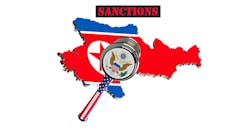North Korean Labor Sanctions Set a Dangerous Precedent
New regulations that require companies to track the nationality of certain workers will add cost and complexity to supply chains, as companies extend the systems they use to track product movements in order to comply with the rules.
Moreover, the regulations could become more onerous if government decides to widen the net by introducing rules that cover more nationalities.
Sanctioning North Korea
As part of tighter trade sanctions on North Korea, the U.S. government wants companies in the U.S. to ensure that North Korean citizens are not being employed directly or indirectly in product supply chains through a new law entitled “Countering America’s Adversaries Through Sanctions Act” (CAATSA). To comply, companies must verify the nationalities of these workers.
Last year, President Trump re-designated North Korea as a state sponsor of terrorism. The change designates goods made by North Korean citizens or nationals as made with forced labor—not just in North Korea, but anywhere in the world.
In July 2018, the U.S. government issued an Advisory that describes how North Korean evasion tactics can expose supply chains to compliance risks. These tactics include the use of subcontracted firms or joint ventures, mislabeling goods, and setting artificially low prices for raw materials or food products.
An estimated 100,000 North Koreans work abroad. They are commonly contracted to work for state-run enterprises and are required to send their wages back to North Korea. Businesses have already been exposed to these risks, owing to the employment of indentured North Korean workers in supply chains.
More Burdensome
Many companies already monitor workers in supply chains to comply with laws such as the California Supply Chain Transparency Act and the UK Modern Slavery Act that combat human trafficking and the use of forced labor. The financial penalties of transgressing these regulations tend to be minimal, although brands can incur substantial reputational damage.
Failure to comply with the CAATSA rules, on the other hand, can be costly in both financial and reputational terms. Non-compliance can result in the seizure of goods or criminal investigation.
The new rules also increase the burden of responsibility on companies. The documentation needed to establish workers’ nationalities is often unavailable or incomplete, and companies use tactics such as employing sub-contractors to frustrate audits.
Another problem is the law’s lack of clarity. CAATSA requires “clear and convincing evidence” that supply chains are free of North Korean nationals, but it is not precise on what companies have to do to fulfill this requirement. General advice offered by the Department of Homeland Security includes supplying a statement to commit to human and labor rights, and completing risk assessments and integrating them into operational oversight systems. Regional regulations such as the General Data Protection Directive in the European Union compound the confusion.
Consequently, the effort needed to comply with CAATSA is time-consuming, expensive, and according to some companies, might not be worthwhile even at the risk of government-imposed penalties.
Possible Responses
Affected companies have three potential avenues of action:
● First, enterprises can accept that investing in improved supply chain visibility in response to increasing risk, stakeholder demands and more stringent regulation has become part of the cost of doing business. However, efforts to improve supply chain visibility are progressing slowly and companies will probably not recoup the costs for many years.
● A second course of action is to focus specifically on addressing the risk of non-compliance with CAATSA. Procurement departments would collect more specific trade information at the company, industry and country levels to assess relevant risks and rank suppliers accordingly. However, this approach is limited because it generally addresses first-tier and, in some cases, second-tier suppliers, but labor violations might happen further upstream or through sub-contracting.
● The third approach is to push back on these politically motivated sanctions. The CAATSA rules set a dangerous precedent, and companies can lobby government to pursue other regulatory approaches to achieving the CAATSA goals.
Risk of Escalation
Companies need to be aware that in today’s highly charged political climate, nationality could become a more regular feature of trade sanctions. Government could expand the list of nationalities they expect companies to scrutinize.
Such a domino effect would add cost and complexity to supply chains. It can take months or years for companies to achieve higher levels of supply chain transparency facilitated by extensive traceability and supplier management. More CAATSA-like rules would make the effort even more burdensome.
Alexis Bateman is a research scientist and director of MIT Sustainable Supply Chains at the MIT Center for Transportation & Logistics.
About the Author
Alexis Bateman
research scientist and director of MIT Sustainable Supply Chains
Alexis Bateman is a research scientist and director of MIT Sustainable Supply Chains at the MIT Center for Transportation & Logistics.
